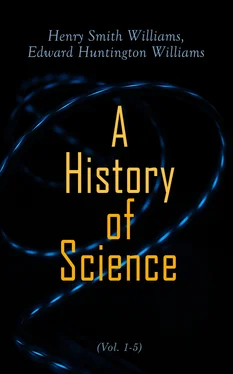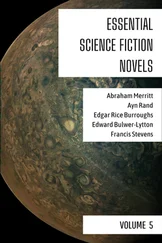Nevertheless, some modern interpreters have found an opposite meaning in Parmenides. Thus Ritter interprets him as supposing "that the earth is in the centre spherical, and maintained in rotary motion by its equiponderance; around it lie certain rings, the highest composed of the rare element fire, the next lower a compound of light and darkness, and lowest of all one wholly of night, which probably indicated to his mind the surface of the earth, the centre of which again he probably considered to be fire."(9) But this, like too many interpretations of ancient thought, appears to read into the fragments ideas which the words themselves do not warrant. There seems no reason to doubt, however, that Parmenides actually held the doctrine of the earth's sphericity. Another glimpse of his astronomical doctrines is furnished us by a fragment which tells us that he conceived the morning and the evening stars to be the same, a doctrine which, as we have seen, was ascribed also to Pythagoras. Indeed, we may repeat that it is quite impossible to distinguish between the astronomical doctrines of these two philosophers.
The poem of Parmenides in which the cosmogonic speculations occur
treats also of the origin of man. The author seems to have had a clear
conception that intelligence depends on bodily organism, and that the
more elaborately developed the organism the higher the intelligence.
But in the interpretation of this thought we are hampered by the
characteristic vagueness of expression, which may best be evidenced by putting before the reader two English translations of the same stanza.
Here is Ritter's rendering, as made into English by his translator,
Morrison:
"For exactly as each has the state of his limbs many-jointed,
So invariably stands it with men in their mind and their reason; For the
system of limbs is that which thinketh in mankind Alike in all and in
each: for thought is the fulness."(10)
The same stanza is given thus by George Henry Lewes:
"Such as to each man is the nature of his many-jointed limbs,
Such also is the intelligence of each man; for it is The nature of limbs
(organization) which thinketh in men, Both in one and in all; for the
highest degree of organization gives the highest degree of thought."(11)
Here it will be observed that there is virtual agreement between the translators except as to the last clause, but that clause is most essential. The Greek phrase is (gr to gar pleon esti nohma). Ritter, it will be observed, renders this, "for thought is the fulness." Lewes paraphrases it, "for the highest degree of organization gives the highest degree of thought." The difference is intentional, since Lewes himself criticises the translation of Ritter. Ritter's translation is certainly the more literal, but the fact that such diversity is possible suggests one of the chief elements of uncertainty that hamper our interpretation of the thought of antiquity. Unfortunately, the mind of the commentator has usually been directed towards such subtleties, rather than towards the expression of precise knowledge. Hence it is that the philosophers of Greece are usually thought of as mere dreamers, and that their true status as scientific discoverers is so often overlooked. With these intangibilities we have no present concern beyond this bare mention; for us it suffices to gain as clear an idea as we may of the really scientific conceptions of these thinkers, leaving the subtleties of their deductive reasoning for the most part untouched.
EMPEDOCLES
The latest of the important pre-Socratic philosophers of the Italic school was Empedocles, who was born about 494 B.C. and lived to the age of sixty. These dates make Empedocles strictly contemporary with Anaxagoras, a fact which we shall do well to bear in mind when we come to consider the latter's philosophy in the succeeding chapter. Like Pythagoras, Empedocles is an imposing figure. Indeed, there is much of similarity between the personalities, as between the doctrines, of the two men. Empedocles, like Pythagoras, was a physician; like him also he was the founder of a cult. As statesman, prophet, physicist, physician, reformer, and poet he showed a versatility that, coupled with profundity, marks the highest genius. In point of versatility we shall perhaps hardly find his equal at a later day—unless, indeed, an exception be made of Eratosthenes. The myths that have grown about the name of Empedocles show that he was a remarkable personality. He is said to have been an awe-inspiring figure, clothing himself in Oriental splendor and moving among mankind as a superior being. Tradition has it that he threw himself into the crater of a volcano that his otherwise unexplained disappearance might lead his disciples to believe that he had been miraculously translated; but tradition goes on to say that one of the brazen slippers of the philosopher was thrown up by the volcano, thus revealing his subterfuge. Another tradition of far more credible aspect asserts that Empedocles retreated from Italy, returning to the home of his fathers in Peloponnesus to die there obscurely. It seems odd that the facts regarding the death of so great a man, at so comparatively late a period, should be obscure; but this, perhaps, is in keeping with the personality of the man himself. His disciples would hesitate to ascribe a merely natural death to so inspired a prophet.
Empedocles appears to have been at once an observer and a dreamer. He is credited with noting that the pressure of air will sustain the weight of water in an inverted tube; with divining, without the possibility of proof, that light has actual motion in space; and with asserting that centrifugal motion must keep the heavens from falling. He is credited with a great sanitary feat in the draining of a marsh, and his knowledge of medicine was held to be supernatural. Fortunately, some fragments of the writings of Empedocles have come down to us, enabling us to judge at first hand as to part of his doctrines; while still more is known through the references made to him by Plato, Aristotle, and other commentators. Empedocles was a poet whose verses stood the test of criticism. In this regard he is in a like position with Parmenides; but in neither case are the preserved fragments sufficient to enable us fully to estimate their author's scientific attainments. Philosophical writings are obscure enough at the best, and they perforce become doubly so when expressed in verse. Yet there are certain passages of Empedocles that are unequivocal and full of interest. Perhaps the most important conception which the works of Empedocles reveal to us is the denial of anthropomorphism as applied to deity. We have seen how early the anthropomorphic conception was developed and how closely it was all along clung to; to shake the mind free from it then was a remarkable feat, in accomplishing which Empedocles took a long step in the direction of rationalism. His conception is paralleled by that of another physician, Alcmaeon, of Proton, who contended that man's ideas of the gods amounted to mere suppositions at the very most. A rationalistic or sceptical tendency has been the accompaniment of medical training in all ages.
The words in which Empedocles expresses his conception of deity have been preserved and are well worth quoting: "It is not impossible," he says, "to draw near (to god) even with the eyes or to take hold of him with our hands, which in truth is the best highway of persuasion in the mind of man; for he has no human head fitted to a body, nor do two shoots branch out from the trunk, nor has he feet, nor swift legs, nor hairy parts, but he is sacred and ineffable mind alone, darting through the whole world with swift thoughts."(8)
How far Empedocles carried his denial of anthropomorphism is illustrated by a reference of Aristotle, who asserts "that Empedocles regards god as most lacking in the power of perception; for he alone does not know one of the elements, Strife (hence), of perishable things." It is difficult to avoid the feeling that Empedocles here approaches the modern philosophical conception that God, however postulated as immutable, must also be postulated as unconscious, since intelligence, as we know it, is dependent upon the transmutations of matter. But to urge this thought would be to yield to that philosophizing tendency which has been the bane of interpretation as applied to the ancient thinkers.
Читать дальше












